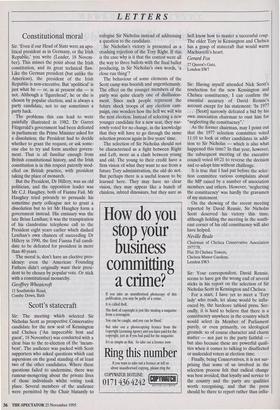LETTERS Constitutional moral
Sir: 'Even if our Head of State were an apo- litical president as in Germany, or the Irish Republic,' you write (Leader, 18 Novem- ber). This misses the point about the Irish constitution, and its great technical flaw. Like the German president (but unlike the American), the president of the Irish Republic is non-executive. But 'apolitical' is just what he — or, as at present she — is not. Although a 'figurehead', he or she is chosen by popular election, and is always a party candidate, not to say sometimes a party hack.
The problems this can lead to were painfully illustrated in 1982. Dr Garret Fitzgerald's government had been defeated in parliament: the Prime Minister asked for a dissolution; the President had to decide whether to grant the request, or ask some- one else to try and form another govern- ment. That is all familiar enough from British constitutional history, and the Irish constitution is in this respect patently mod- elled on British practice, with president taking the place of monarch.
But the President, Dr Hillery, was an old politician, and the opposition leader was Mr C.J. Haughey, both of Fianna Fail. Mr Haughey tried privately to persuade his sometime party colleague not to grant a dissolution but to let Mr Haughey form a government instead. His emissary was the late Brian Lenihan; it was the transpiration of his clandestine telephone call to the President eight years earlier which dashed Lenihan's own chances of succeeding Dr Hillery in 1990, the first Fianna Fail candi- date to be defeated for president in more than 40 years.
The moral is, don't have an elective pres- idency: even the American Founding Fathers didn't originally want their presi- dent to be chosen by popular vote. Or stick with a constitutional monarchy.
Geoffrey Wheatcroft 11 Southstoke Road,
Combe Down, Bath


















































































 Previous page
Previous page